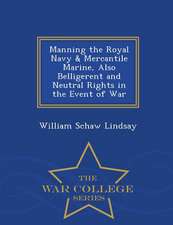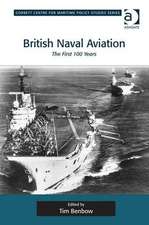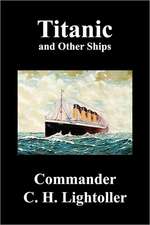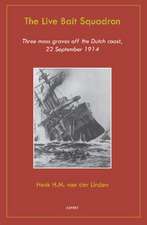The History of Merchant Shipping: From American Independence to the Suez Canal
Autor William Schaw Lindsayen Limba Engleză Hardback – 29 aug 2017
Preț: 2388.29 lei
Preț vechi: 3380.88 lei
-29% Nou
Puncte Express: 3582
Preț estimativ în valută:
457.01€ • 479.34$ • 380.44£
457.01€ • 479.34$ • 380.44£
Carte disponibilă
Livrare economică 11-25 martie
Preluare comenzi: 021 569.72.76
Specificații
ISBN-13: 9781780768878
ISBN-10: 1780768877
Pagini: 1350
Dimensiuni: 156 x 234 mm
Greutate: 0 kg
Editura: Bloomsbury Publishing
Colecția I.B.Tauris
Locul publicării:London, United Kingdom
ISBN-10: 1780768877
Pagini: 1350
Dimensiuni: 156 x 234 mm
Greutate: 0 kg
Editura: Bloomsbury Publishing
Colecția I.B.Tauris
Locul publicării:London, United Kingdom
Notă biografică
Head of William Lindsay and Co., one of the largest shipowners in the world. Member of Parliament for Sunderland and for Tynemouth and South Shields.
Cuprins
Table of ContentsSelected contentsVolume 1Ch.1 Rapid rise of New Orleans and New York; Boston ships extend the trade to India and China; Mercantile marine laws of the United States; Superiority of native American seaman owing to their education; Conditions of wages; Power of Appeal to the Admiralty CourtsCh.2Education of merchant seamen in Denmark, Norway and Sweden, Russia and Prussia, France; Qualifications of Venetian shipmasters; Present regulations of Austria; Consuls of Genoa, Ancona, Naples; Report of Consuls in South America; Shipowners condemned for character of their ships and officers; Necessity of a competent Marine DepartmentCh.3High estimate abroad of English Navigation Laws; Change necessary owing to Independence of America; Commercial treaties with America; Conciliatory steps of the Americans; Reciprocity treaties; Shipowners who seek protection against Colonial shipping; Lord John Russell leads the way against protection; Effects of Irish FamineCh.4Equalization of Sugar Duties; Navigation Laws suspended; Rules in force in the Plantation Trade; First infringement of the principle of confining the American trade to British vessels; State of the law before the Declaration of American Independence; Trade with Europe; East India trading and shipping; Trade with India in foreign and in United States shipsCh. 5Progress of changes in Navigation Laws; Reciprocity Treaties; Registry Laws; Naturalization of goods brought to Europe; Story of the cochineal; Special views of the Canadians; Free Trade with United States desired; Canadian urge abolition of Protection; Welland Canal; West Indians for Free Trade; Divergent views of capitalists at homeCh. 6Ships built more cheaply abroad; Views as to captains of merchant ships; Praise for their nautical skills; Views of Collector of Customs in London; Difficulty about manufactured articles; Anomalies of coastal and internal trade; Commercial panic and distress of 1847Ch. 7Suspension of New Parliament; Mr Bancroft's Declaration; Lord Clarendon tells shipowners laws will not be altered; Lord Palmerston admits correspondence with America; Evidence of shipowners before the Lord's Committee; Claim in favour of direct voyages; Importance of keeping up the merchant navy; Working of the system of apprenticeship; Details about American ships; Reciprocity treaties so far as they affect the AmericansCh. 8Protectionist principles stated; Extent of shipping trade; National defences endangered; Mt Gladstone's views; Lord George Bentinck; Mr Disraeli; Rely of America; Proposed change in coasting trade; Meeting of Shipowners' Society; Agitation in the countryCh. 9Question of reciprocity; Difficulty of 'favoured nation' clause; Burdens to be removed from shipowners; Coasting trade; Americans not free-traders; Smuggling in the coasting trade; Details of American law; Lord Russell; Mr DisraeliCh. 10Protected and unprotected trade; Napoleon's desire for ships, colonies and commerce; Increase of foreign peace establishments; Canada not our only colony; Claims of shipowners and fear of competition; Timber duties; Coasting trade thrown open; Americans throw open all except their coasting trade Ch. 11Dependence of many shipowners on repeal of Navigation Laws; Advantages naturally taken by foreigners, especially Americans; demand for enforcement of reciprocity on foreign nations; Certificates of examination; Institution of Naval Courts abroad; Merchant Shipping Act 1854; New measurements of ships; Registration of ships; WrecksCh. 12Parliamentary Inquiry 1854-5; Emigration system; Runners and crimps; American emigration law; Disgraceful state of emigrant ships; Resolution of New York Legislature 1854; Legislation in the United States 1855; English Passenger Act 1855; Fraudulent tickets; Merchant Shipping Act discussed; Question of limited liability; Powers given to Board of Trade; Examination required for engineers










